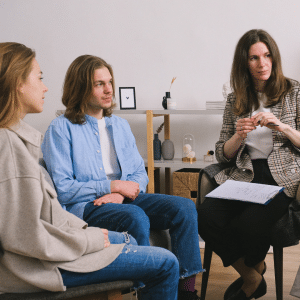How does cognitive behavioral therapy work for social anxiety?
Maddison Henley PA-C

Many individuals with social anxiety might be familiar with the term Cognitive Behavioral Therapy or CBT. But do we actually understand what it entails, and more importantly, how it can be effective to manage social anxiety disorder? Let’s look deeper into how CBT works.
What is Cognitive Behavioral Therapy?
CBT is a form of psychotherapy designed to treat mental disorders by changing harmful thought patterns and behaviors. It is the most widely recognized method for treating social anxiety disorder (SAD). CBT identifies negative thoughts and behavior patterns and teaches individuals how to challenge these harmful patterns, replacing them with healthier, more positive alternatives.

How Does CBT Work for Social Anxiety?

Those with Social Anxiety usually fear being judged or embarrassed in social situations. Negative thoughts patterns reinforce this fear, making him/her more likely to stay away from social interactions. This is where CBT steps in, to help individuals learn to confront these fearful situations rather than avoid them.
CBT and Social Exposure
A key part of CBT for Social Anxiety is social exposure. Social exposure involves confronting the social situations that cause anxiety in a structured, gradual manner, instead of avoiding them. The aim is to become desensitized to these situations over time, thereby reducing anxiety levels.
CBT typically involves the following steps:
Identification: Identifying the situations, thoughts, and behaviors that cause anxiety
Challenge: Learning to challenge negative thoughts with rational thinking
Change: Adapting behaviors to cope with anxiety-producing situations, and changing negative thought patterns to more positive interpretations.
Practice: Gradual exposure to feared situations, starting from the least fear-inducing to the most anxiety-producing.
A Therapeutic Process:
Here are the steps typically involved in CBT for social anxiety:

Engaging Conversation: The therapist engages the patient in a conversation to identify distressing situations and to understand their thoughts and behaviors in relation to these events. The initial sessions of CBT focus heavily on building a rapport and forming a trusting relationship between the patient and the therapist.
Cognitive Reconstruction: This stage involves identifying negative thoughts and restructuring them. The key is to recognize unrealistic thoughts and replace them with more rational, reality-based thoughts.
Behavioral Training: Patients are trained to confront anxiety-inducing situations and adapt healthier coping mechanisms. This could include deep breathing, visualization, and other techniques to reduce anxiety.
Exposure Therapy: Gradual exposure to situations that cause anxiety in a controlled environment helps decrease the fear and anxiety associated with it, thereby encouraging more social interactions.
In summary:
In my role as a mental health provider, I’ve seen the profound effects of Cognitive Behavioral Therapy (CBT) on patients struggling with social anxiety. CBT empowers them to manage their anxiety through cognitive restructuring, a process where they identify and counteract negative thought patterns, and exposure therapy, which involves gradually confronting anxiety-triggering situations in a safe, controlled environment. I’ve observed patients challenge their self-defeating beliefs, like the fear of inevitable embarrassment, and replace them with balanced and realistic perspectives.
Over time, these patients demonstrate a remarkable reduction in their anxiety response. What once felt like insurmountable tasks, such as participating in a simple conversation, become manageable. By committing to CBT, they navigate social scenarios with increased confidence and less fear. Although it’s not a quick fix, the substantial progress I’ve seen reaffirms the effectiveness of CBT in treating social anxiety.
If you’re struggling with social anxiety and think that CBT might be a good fit, consider speaking to a licensed mental healthcare professional about it. They can provide more detailed guidance and help to chart out a suitable course of therapy tailored to your needs. Remember, it’s okay to seek help. Your mental health is important!
Responsibly edited by AI
Other Blog Posts in
Animo Sano Psychiatry is open for patients in North Carolina, Georgia and Tennessee. If you’d like to schedule an appointment, please contact us.
Get Access to Behavioral Health Care
Let’s take your first step towards. Press the button to get started. We’ll be back to you as soon as possible.ecovery, together.




